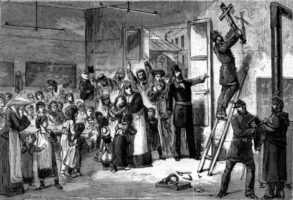
Published April 24, 2017
The biggest surprise to come out of the first round of France’s presidential election is that there was no surprise. The polls were right: The runoff will feature centrist and political newcomer Emmanuel Macron up against populist leader Marine Le Pen.
But what matters more for the future of France is who isn’t in the runoff. The candidates of the Socialist Party and the Republican Party, the two parties that have governed France in some form or another, were booted from contention, a historic first. French politics is reconfiguring itself alongside a new fault line; in the country that invented the concept of the left/right divide, the left/right divide is passé. It has been replaced by the top/bottom divide.
In France, as in every other major Western country to some extent, the changes brought about by globalization, technological advancement, and sexual liberalization have tended to split society along class lines, with the winners of globalization detaching themselves from the rest of society even as the losers sink further. And as in most of those countries, both main parties have both a working class and an elite constituency.
Emmanuel Macron is without a doubt the candidate of the French elite. He is a member of one of the most rarefied crops of French technocrats, an inspecteur général des finances, the cream of the crop of graduates from ÉNA, France’s civil service school whose graduates dominate politics and industry. In between his work in the French Ministry of Finance and his work advising President Hollande on economic policy, he did a stint in investment banking, becoming a millionaire in the process.
Macron was the only unapologetically pro-EU candidate in a country that dislikes the EU but whose elite believe the nation-state is to be transcended. His economic policy is vintage neoliberalism, thoroughly pro-trade, removing some regulations on business (though not too many) while trimming the sails of the welfare state (but not too much), and his agenda is a hodge-podge of small-bore technocratic initiatives. He has praised Angela Merkel’s decision to open Europe’s gates to millions of migrants, and was virtually endorsed by the German government for his promises to hold down France’s deficit. He caused controversy by once stating that “there is no such thing as French culture” (he meant that French culture is a mosaic of various cultures).
His opportunistic, mushy centrism is nearly comical: His habit during a presidential debate of starting every rejoinder by noting the opponent’s points he agreed with became a meme (Le Gorafi, the French version of The Onion, headlined his victory speech thus: “I Agree With The Voters Who Voted Against Me”), and during his actual victory speech, he took the time to thank every single one of his opponents by name (tellingly, except for Marine Le Pen). Yet underneath this apparent ideological flexibility there is a deep coherence: Macron is for whatever happens to be in the interests of the French ruling class.
The notorious Le Pen, meanwhile, is the leader of the populist movement representing the losers from the changes over the past decades. She is anti-immigration, anti-euro, anti-EU, anti-crime, but also anti-globalization and anti-liberalization. One of her signature issues was a major Hollande-era bill that slightly liberalized the French labor market and which she vowed to overturn — while Macron’s main complaint about it is that it didn’t go far enough. Le Pen’s core of support is the French working class, and one of the strongest correlates for Le Pen support is downward mobility.
While the old French parties had real differences, particularly on the size and scope of government, those differences still played out within a reigning post-war consensus. Meanwhile, it’s hard to think of an issue where Macron and Le Pen aren’t diametrical opposites, whether economics, foreign policy, immigration, or social issues. This is because, unlike the old parties, they represent fundamental differences about what ails the country and where to take it.
And their differences actually represent the rift in opinion regarding the main question facing France: How will the country deal with globalization? Does nationhood still mean anything in the 21st century, and if so, what? Is the global free movement of people an unalloyed good? Is the reigning milquetoast free market consensus a tide that lifts all boats, or does it just deepen inequality? More profoundly, is individual autonomy an absolute value, or do community and tradition still matter?
There is virtually no chance that Le Pen will win this time around, but given his own personal background and agenda, Macron represents the perfect foil for her. Macron’s government will feature faces from both left and right and will probably be unable to carry out significant reforms without a majority in Parliament, since Macron does not have a party behind him. He will validate her critique that the differences between left and right are just cosmetic and that the lot as a whole are incompetent.
But at the very least, the presidential debate will lay bare the tensions at the heart of French society and finally show the real issues facing the country. If it is true that, as goes France, so goes Europe, and as goes Europe, so goes, eventually, the world.
Pascal-Emmanuel Gobry is a fellow at the Ethics and Public Policy Center.








